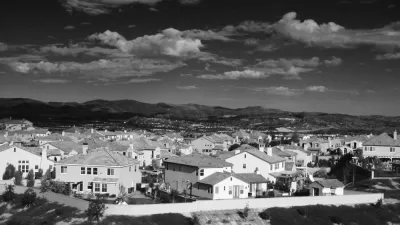It's not a popular viewpoint, but what if suburbs end up being more critical to a sustainable and efficient future than dense urban areas?

Randy Rieland reports on a proposition that might come as a shock, or even an affront, to some who call themselves urbanists: the future of the built environment could still be suburban.
Rieland relies on the ideas and research of Alan Berger, a professor of landscape architecture and urban design at MIT, who recently convened the "Future of Suburbia" conference. Among the speakers and futurists at the event, a much more environmentally friendly portrait of the suburbs emerged:
Their model of a future metropolitan area of 3 million people looks very different from what we’ve come to know. Rather than have neighborhoods continuously spreading outward from a downtown core, it presents a handful of dense clusters amid what Berger describes as a “big sea of suburban development that’s much more horizontal than vertical." It would, he says, function as a “kind of holistic sustainable machine.”
One key concept of Berger's argument: that U.N.'s 2014 "World Urbanization Prospects" report built a misconception that the majority of the world's population now lives in urban areas (i.e., not the suburbs). In fact, says Berger, most of those people are moving to suburbs. "Certainly, the world’s urbanizing, but it’s urbanizing in a much different way than cities," says Berger in a direct quote. "It’s urbanizing horizontally."
FULL STORY: Suburbia Gets No Respect, But It Could Become a Very Different Place

Maui's Vacation Rental Debate Turns Ugly
Verbal attacks, misinformation campaigns and fistfights plague a high-stakes debate to convert thousands of vacation rentals into long-term housing.

Planetizen Federal Action Tracker
A weekly monitor of how Trump’s orders and actions are impacting planners and planning in America.

Chicago’s Ghost Rails
Just beneath the surface of the modern city lie the remnants of its expansive early 20th-century streetcar system.

Bend, Oregon Zoning Reforms Prioritize Small-Scale Housing
The city altered its zoning code to allow multi-family housing and eliminated parking mandates citywide.

Amtrak Cutting Jobs, Funding to High-Speed Rail
The agency plans to cut 10 percent of its workforce and has confirmed it will not fund new high-speed rail projects.

LA Denies Basic Services to Unhoused Residents
The city has repeatedly failed to respond to requests for trash pickup at encampment sites, and eliminated a program that provided mobile showers and toilets.
Urban Design for Planners 1: Software Tools
This six-course series explores essential urban design concepts using open source software and equips planners with the tools they need to participate fully in the urban design process.
Planning for Universal Design
Learn the tools for implementing Universal Design in planning regulations.
planning NEXT
Appalachian Highlands Housing Partners
Mpact (founded as Rail~Volution)
City of Camden Redevelopment Agency
City of Astoria
City of Portland
City of Laramie




























